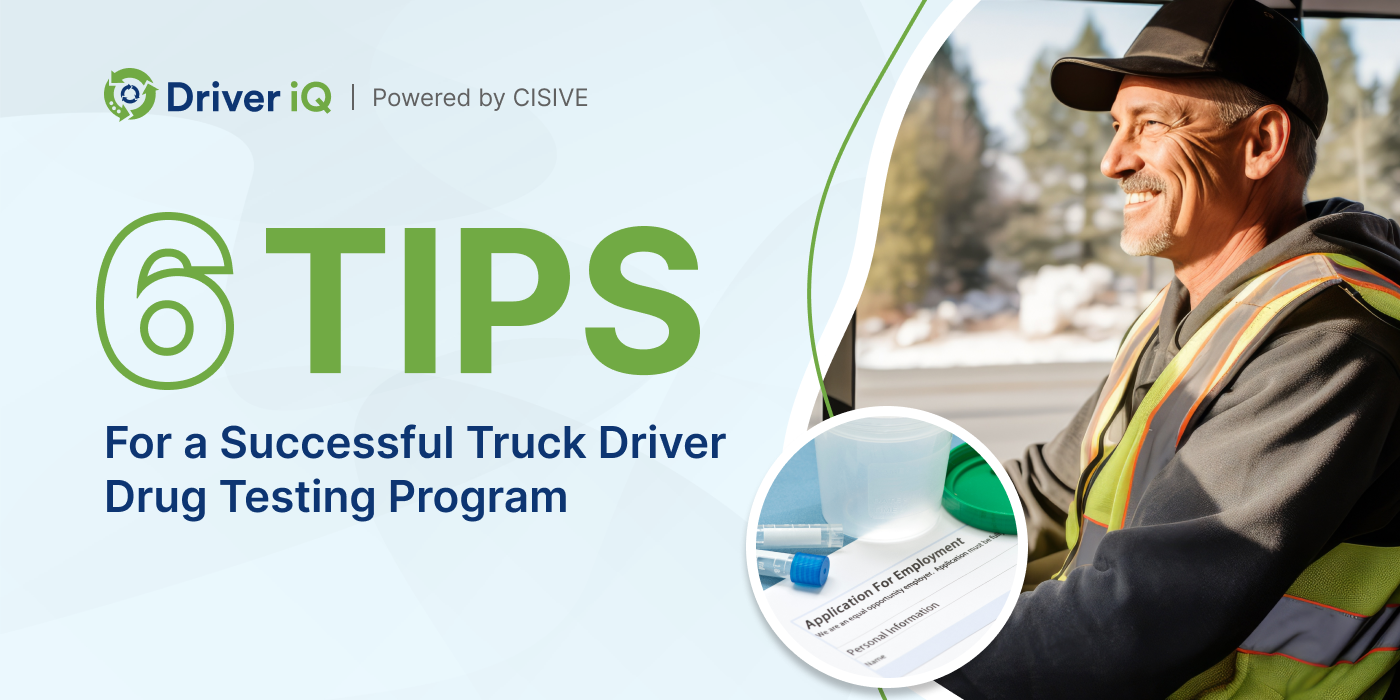
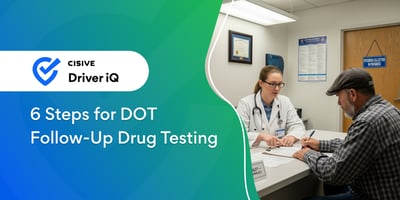
When drivers fail a DOT-mandated drug or alcohol test or refuse to take one, they create...

Secure and reliable transportation networks rely on commercial drivers who are fit for duty and free from the influence of drugs or alcohol. To uphold these standards, the Department of Transportation (DOT) has established comprehensive drug-testing requirements for commercial driver's license (CDL) holders. DOT CDL drug-testing requirements help motor carriers vet drivers and stay in compliance.
This guide to drug-testing requirements for employers and drivers will help motor carriers and CDL holders understand how they can stay in compliance and prioritize safety every step of the way.
QuickRead:
|
The FMCSA, which is a part of DOT, sets drug-testing requirements for CDL holders.
Drivers who operate commercial motor vehicles (CMVs) requiring a CDL are subject to drug-testing requirements. These include pre-employment testing, random testing, post-accident testing, reasonable suspicion testing, return-to-duty testing, and follow-up testing.
FMCSA regulations specify testing procedures and protocols for substances including marijuana, cocaine, amphetamines, opiates, and phencyclidine (PCP). Urine is the most common testing method. Oral fluid testing was recently approved by the FMCSA, although there are still a few requirements that need to be met before this form of testing can be implemented.
The DOT’s drug and alcohol testing program applies to:
Additionally, FMCSA operates the Drug and Alcohol Clearinghouse. This is a secure online database available to the FMCSA, state driver-licensing agencies, state law enforcement personnel, and companies that employ CDL drivers. The database allows approved users to identify drivers who are prohibited from operating a CMV based on drug or alcohol violations. The Clearinghouse also maintains records on drivers’ post-violation evaluation and treatment. This helps employers identify drivers who are cleared to return to duty.
Employers should consult FMCSA regulations or seek legal advice for the most up-to-date and accurate information regarding drug-testing requirements for CDL holders.
CDL truck drivers are responsible for their safety and those of other people, but driving while impaired jeopardizes that safety. Here are five reasons for the DOT's drug-testing requirements and how they promote a secure and responsible transportation system.
The primary reason for drug-testing requirements is to ensure the safety of the public, including other drivers. Large commercial vehicles can cause significant damage if involved in accidents. Drug testing helps identify and deter drivers from partaking in drugs or alcohol while performing safety-sensitive functions.
The DOT defines “safety-sensitive functions” as:
Drivers who perform any of the above functions while under the influence of drugs or alcohol can lose their license, among other consequences.
Drug testing can deter prohibited substance use among CDL drivers because they know that they are subject to a variety of testing situations, including random drug testing. They might be less likely to engage in drug or alcohol use while employed by a trucking company.
Employers that hire CDL drivers must follow all applicable laws related to safe commercial truck operation. Drug-testing programs demonstrate this commitment to safety and can reduce employer liability in the event of accidents caused by impaired drivers.
Safety-sensitive functions also apply to cargo handling, such as loading or unloading shipments. CDL drivers have a responsibility to protect cargo and, in the case of hazardous materials, transport it safely to its destination without putting the public at risk. Drug testing can reduce the likelihood that drivers are under the influence while transporting cargo, especially hazardous or otherwise dangerous goods.
Drug-testing requirements ensure that all CDL drivers are subject to the regulations, making the process fair and nondiscriminatory. Additionally, motor carriers are prohibited from singling out individual drivers for testing unless they have reasonable suspicion of drug or alcohol use while performing safety-sensitive functions.
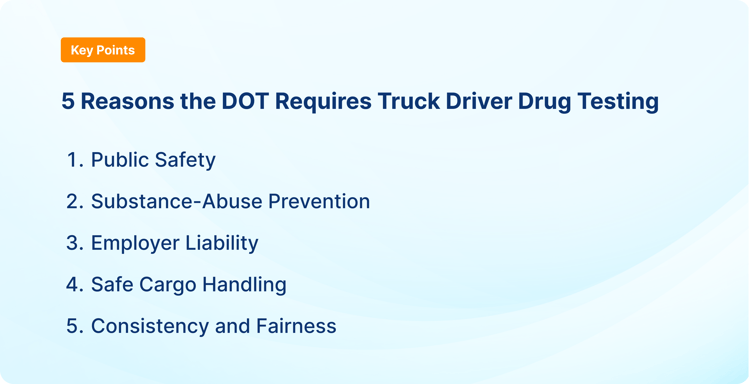
The DOT regulates drug testing for employees who perform safety-sensitive functions, as well as employer obligations for continued testing and reporting. Learn more about employer responsibilities for drug and alcohol testing of CDL drivers.
Employers have several obligations related to the Drug and Alcohol Clearinghouse.
Before employing a driver subject to testing for controlled substances and alcohol, employers must conduct a pre-employment query with the Clearinghouse. This query reveals driver history, including verified positive, adulterated, or substituted controlled substances test results, alcohol confirmation tests with a concentration of 0.04 or higher, refusals to submit to a test, and other instances of alcohol or controlled substance use in violation of regulations.
Employers must conduct an annual query from the Clearinghouse for all employees subject to testing for controlled substances and alcohol. This query determines whether new relevant information has emerged in the Clearinghouse. Employers must retain records of each query and the information obtained for three years.
Employers also have reporting requirements. For example, before querying the Clearinghouse, they must obtain written or electronic consent from drivers. If employers discover drug or alcohol violations among employed CDL drivers, they must report those to the Clearinghouse within three days of learning of the violation. Employers can authorize consortium/third-party administrators (C/TPA) to submit this information on your behalf.
DOT regulations require motor carriers to randomly test CDL drivers for drugs and alcohol, but you must exercise caution when making these selections. Your selection process must be scientifically valid, and every driver must have an equal chance of being selected for unannounced testing.
Keep the names of selected drivers confidential until the carrier notifies them to undergo testing. Once notified, drivers must proceed to the testing facility for the required tests. After a driver is tested, their name is returned to the selection pool.
Random tests for controlled substances may be conducted at any time once the driver is notified. The DOT also mandates random alcohol testing, but that test can only be administered shortly before, during, or after a driver performs a safety-sensitive function.
If a driver is selected for testing and refuses to submit, it is treated as if they failed a drug test and they must follow the requirements outlined in 49 CFR Part 40, Subpart O.
Employers are required to test drivers for drugs and alcohol after most accidents. Alcohol tests must be performed within eight hours of an accident, while controlled substances tests must be given within 32 hours.
If an accident results in a fatality, the CDL drivers involved must be tested, regardless of whether the driver received a citation. This testing requirement can also apply to CDL drivers who are cited for a moving violation. Such testing is required for moving violations that occur during an accident where a vehicle is towed or someone receives medical attention away from the scene. These requirements are often referred to as the “hearse, nurse, or tow” rule.
Employers should maintain records of the testing process. Noncompliance can lead to penalties. As some citations which trigger a drug testing requirement may not be issued until days after an incident, companies should also keep documentation as to why post-accident drug testing was not completed.
Employees who test positive for substances must be immediately removed from safety-sensitive duties. Employers should act upon an initial report without waiting for a written report or the results of a split-specimen test. If the test result is verified as adulterated or substituted, that's considered a refusal to test, and the employee must be immediately removed from safety-sensitive functions.
For alcohol test results of 0.04 or higher, the employee must be promptly removed from safety-sensitive functions. For alcohol test results of 0.02 to 0.039, temporary removal is required as per applicable DOT agency regulations.
Any employee with a positive, adulterated, or substituted test result or who has otherwise violated a DOT agency drug and alcohol regulation must be removed from safety-sensitive functions. They can’t resume those duties until they complete the return-to-duty process outlined in Subpart O of the regulations. Employers must also take appropriate action when receiving dilute drug test results or when a test is canceled due to invalidity.
Additionally, employers may have additional obligations under DOT regulations.
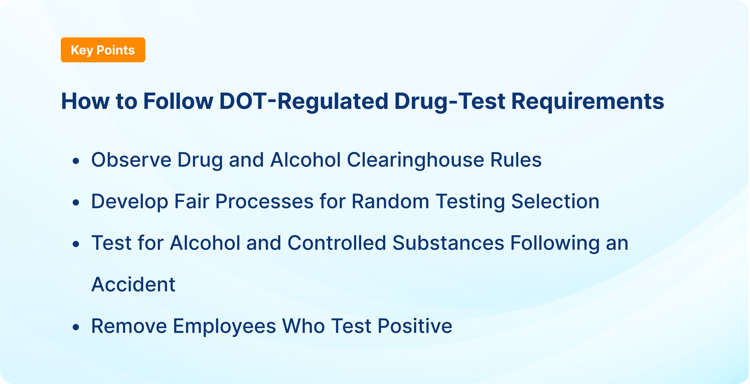
Motor carriers face potential legal liability if they fail to follow federal drug-testing regulations. This liability includes fines and other penalties, including the suspension or revocation of their operating authority. Furthermore, carriers face regulatory consequences for inconsistently or inaccurately reporting drug-testing results to the FMCSA Drug and Alcohol Clearinghouse.
When carriers improperly conduct drug testing, they increase their risk of hiring drivers with substance-abuse issues. This adds to the risk of impaired driving and accidents. Inadequate drug-testing practices can compromise the safety of your drivers and other people, as well as the reputation of your company and the entire transportation industry.
Effective and efficient drug-testing programs help trucking companies follow regulations and maintain a safe working environment. Here are six best practices for managing drug-testing programs for truck drivers.
Develop a drug-testing policy that outlines the expectations, procedures, and consequences related to substance use and impairment. Ensure that the policy aligns with DOT regulations and clearly communicates the company's commitment to safety.
Regularly educate employees about the drug-testing program, emphasizing the importance of compliance and the consequences of noncompliance. Lastly, maintain strict confidentiality throughout the process. This protects the privacy and rights of employees while upholding the program’s integrity.
Partner with a reputable C/TPA, like Cisive or Driver iQ, to manage your CDL drug-testing program. A C/TPA can manage your random testing pool, coordinate testing services, and ensure accurate record-keeping, among other services. C/TPAs can also offer expertise to help you better manage CDL drug-testing programs, including how to comply with DOT regulations.
Implement pre-employment drug testing for all new CDL driver hires, both as a best practice and to meet federal regulations. Make sure to follow DOT guidelines for pre-employment testing, including using approved testing methods and laboratories. Finding the information you need to make an informed hiring decision can be challenging, but a C/TPA that's well-versed in the Clearinghouse and other relevant databases can help.
Establish a program for random drug testing. Working with a C/TPA can relieve your staff of the burden of managing this process. A C/TPA can help with tasks including selecting drivers for testing, coordinating with testing facilities, and maintaining accurate records.
Offer regular education and training programs to CDL drivers and supervisors on the importance of drug-free workplaces, the consequences of drug use, and the company's drug-testing policies. This helps create awareness, promotes a culture of safety, and ensures that everyone understands their responsibilities and obligations.
Keep detailed and accurate records of all drug-testing activities, including test results, documentation, and follow-up actions taken. This documentation is essential for compliance purposes. If there is an audit or investigation, you’ll have records that provide evidence of a well-managed drug-testing program, as well as relevant communications.
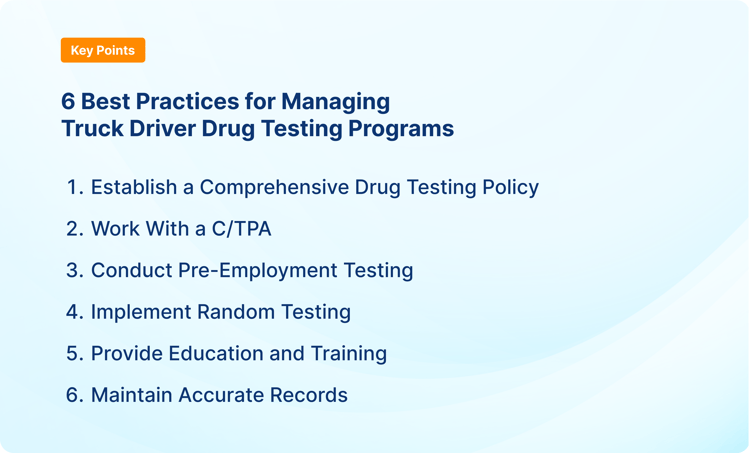
Motor carriers who follow DOT CDL drug-testing requirements will keep their drivers safe, reduce accidents, and improve the transportation industry’s standing. Beyond the benefits of a safe, drug-free workplace culture, the consequences of noncompliance can be severe, including penalties, loss of reputation, damaged cargo, and potential injury and death
A reputable C/TPA can provide invaluable guidance, expertise, and support in managing your drug-testing program, ensuring compliance, and maintaining accurate records. By partnering with a C/TPA, motor carriers can navigate the complexities of drug-testing requirements with confidence.
Cisive’s suite of solutions help you maintain compliance with DOT-wide regulations. Speak with a Cisive expert to get started.
Author: Michael Kapuschinsky
Bio: Product Manager with more than a decade of experience in the transportation industry.
Let's Connect on LinkedIn
When drivers fail a DOT-mandated drug or alcohol test or refuse to take one, they create...
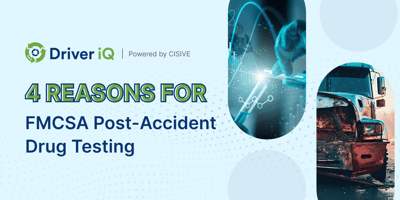
The Federal Motor Carrier Safety Administration's (FMCSA) post-accident drug testing regulations...
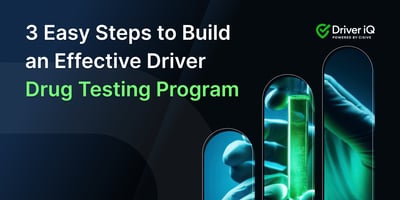
Motor carriers need to hire drivers who are safe and reliable, both for the public’s safety and...